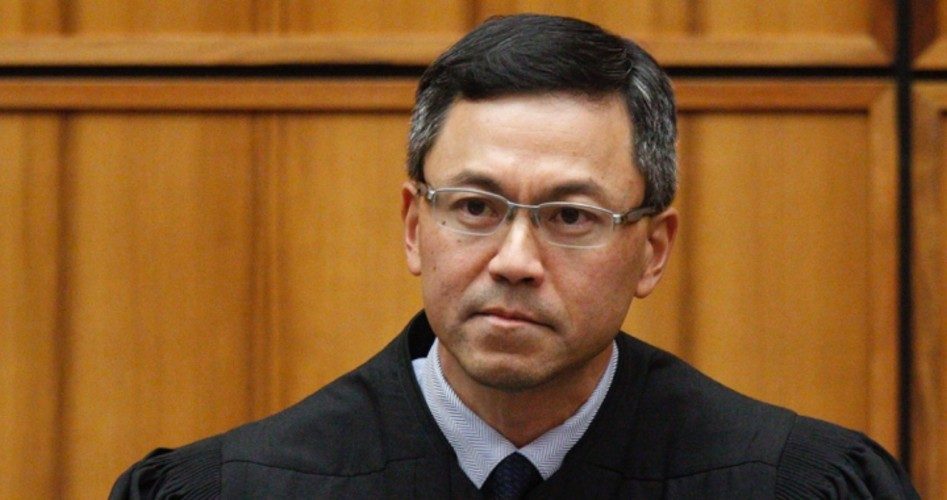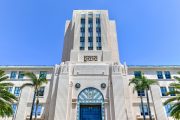
U.S. District Court Judge Derrick Watson (shown) of the Federal District Court in Honolulu issued an order on March 29 converting his March 15 temporary restraining order against the Trump administration to a longer-term preliminary injunction. The judge’s earlier order temporarily blocked the administration from enforcing President Trump’s March 6 Executive Order No. 13,780, entitled “Protecting the Nation from Foreign Terrorists’ Entry into the United States.”
Watson issued the new order in response to a complaint filed by the State of Hawaii and Dr. Ismail Elshikh — the imam of the Muslim Association of Hawaii.
That executive order banned foreign nationals from six countries identified as being state sponsors of terrorism or havens for terrorists. It was scheduled to take effect on the March 16, but was blocked shortly before being implemented by rulings from two federal judges, Watson in Hawaii and U.S. District Judge Theodore Chuang in Maryland.
Both judges asserted that the executive order amounted to religious discrimination against Muslims. Though all six nations covered by the order have Muslim majorities, Trump has denied that his order targets Muslims, specifically, but merely continues national security policies put in place by his predecessors.
The March 6 executive order was a revision of an earlier January 27 executive order banning entry to the United States from seven nations. After another judge in Seattle issued a ruling stopping Trump’s January 27 executive order, Trump issued a statement two days later that said, in part:
The seven countries named in the Executive Order are the same countries previously identified by the Obama administration as sources of terror. To be clear, this is not a Muslim ban, as the media is falsely reporting. This is not about religion — this is about terror and keeping our country safe. There are over 40 different countries worldwide that are majority Muslim that are not affected by this order.
The second executive order that Trump signed on March 6 dropped some language that had been included in his original January 27 travel ban order that made exceptions for religious minorities. This should have removed any justification for calling the order a ban on Muslims, but judges Watson and Chuang were still not satisfied with the revised language. Both judges (who were appointed by former president Obama) made numerous references to Trump’s alleged anti-Muslim bias in their respective decisions. Chuang speculated that the likely purpose of the executive order was “the effectuation of the proposed Muslim ban” that Trump had proposed enacting early in his presidential campaign.
Like Chuang, Watson, in his March 15 ruling, also preferred to judge not what the executive order says, but what he believes it means “in context.”
Following Chuang’s and Watson’s rulings on March 16, the Trump administration brought an appeal to the 4th U.S. Circuit Court of Appeals (which covers appeals from district courts in Maryland, Virginia, West Virginia, and the Carolinas). On March 24, Judge Anthony Trenga of that court upheld President Trump’s revised March 6 executive order.
Although Trenga’s ruling contradicted those made by Chuang and Watson, Trump’s order remained suspended.
However, Trenga’s ruling is still not the final word on the appeal, and the 4th U.S. Circuit Court of Appeals is set to hear the Justice Department’s challenge to Chuang’s decision on May 8.
CNN reported on March 27 that normally, such an appeal would be heard by a randomly assigned panel of three judges on the appeals court. But on that day, the appeals court issued an order asking both sides whether the case should be heard by the full court — otherwise known as “en banc” review —in the first instance and skip the three-judge panel.
Stephen Vladeck, a CNN contributor and professor at the University of Texas School of Law told the network:
It’s unusual for a court of appeals to go en banc at such an early stage, but not unheard of — and may simply signal an entirely understandable view that, given the significance of the questions presented, the matter was likely to go to the full court even if it was first heard by a three-judge panel.
Given that, and given that the travel ban remains on hold pending the appeal, I think it’s a rather frank admission by the court of appeals that, regardless of how it comes out, this case is a pretty big deal — and ought to be treated as such.
The 4th U.S. Circuit Court of Appeals will decide only on Chuang’s decision, not Watson’s. Following Watson’s latest ruling, the Justice Department may now immediately appeal his ruling to the 9th Circuit Court of Appeals, which covers the Western states.
Photo of U.S. District Court Judge Derrick Watson: AP Images
Related articles:
Federal Judge Upholds Trump Travel Ban Blocked by Other Courts
Federal Judges Again Block Trump Travel Ban From Nations With Terrorist Ties
Trump Signs New Immigration Executive Order
Judge Grants Stay to Bar Trump DHS From Deporting Aliens From Seven Nations of Concern
Trump’s Order Suspending Refugee Program: Racism or Balanced National Security?
Trump Executive Order to Ban Nationals of “Countries of Particular Concern”
Regarding Fake Passports for Syrians
Obama Scrapping Registration of Aliens From Mostly Muslim Nations
Sons of Middle Eastern Immigrants Recruited by Terrorist Groups
Border Patrol: Arrests of Pakistanis, Afghans Up This Year
Military Concerned About Large Numbers of Individuals From Terrorist Regions Crossing Border
Smuggling Network Brings Aliens With Terrorist Ties Across U.S. Border
Mexican Cartels Moving Terrorists Across Southern U.S. Border
Terrorist Smuggling Into U.S. a Real Concern
Pakistanis With Terrorism Ties Caught After Crossing U.S.-Mexican Border



